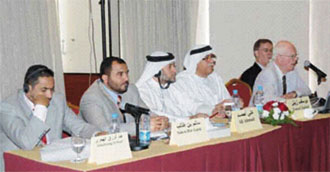
|
 |
 |
|
|
|
|
|
|
|
|
|
|
|
|
|
|
|
|
|
|
|
|
|
|
Draft Law on the Right of access to InformationThe parliamentary block of the Islamic Platform Society presented the House of Representatives with a draft law which gives citizens the right to obtain public information. It comprises of 20 articles which includes questioning any employee who does not comply with this law. The draft law also states that a council for information should be established under the authority of the Prime Minister and headed by the Minister of Information. The draft also provides for the exceptions which would allow the Govern?ent to withhold information from its citizens, especially those related to national security and individual cases - among others.
Bahrain Transparency and Journalists’ Societies organized a workshop with IREX to discuss the draft law on 6 June 2009, with the presence of a number of MPs, journalists, unions, in addition to representatives of political and human rights societies. During the workshop, a number of the participants opposed article 12 which authorizes the Minister of Information to head the body in charge of protecting the right to access information. The Director of the National Democratic Action Society, Ibrahim Sharif, ?ustifies his opposition by saying that ‘the Ministry of Information is the body which imposes censorship and was , in fact, responsible for closing websites and prohibiting the publication of several books and leaflets, so how can it be the guardian of the right of access to information?’. The Vice President of the Transparency Society, Yusuf Zainil, pointed to the importance of the law and regards it as the foundation for ‘enabling citizens and the media to hold the administration and officials accountable for their actions’. He also sees an impartial judicial system as ‘the backbone for the protection of fundamental rights such as the right to access to information, and the effective application of laws which is the strongest guarantee for the state of institutions and the rule of law’. On the other hand, the representative of the International Senior Lawyers, Richard Winfield, demanded keeping the exceptions in this law to a minimum; arguing that a large number of exceptions will only hinder its application and benefits. This law had specified 11 exceptions which can be used to withhold a large amount of information. The board member of the Journalists’ Society, Muhammad Al-Ahmad, presented a paper in which he strongly criticized the House of Representatives for delaying the discussion and adoption of the Press and Publication Law. He also stressed the need for passing this law alongside the law for access to information, and added that ‘the problem of obtaining information is not merely a law related issue. It is true that the existence of such a law is a big step forward, but the real problem lies in the culture of ?reely flowing information. Indeed, there exists a large amount of information that is protected by these bodies in order to ensure that it remains confidential and that none of it is leaked to the public. This is done under the assumption that this information truly deserves this high level of caution’. |
